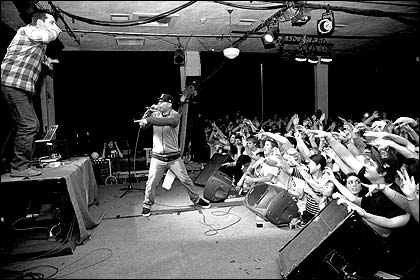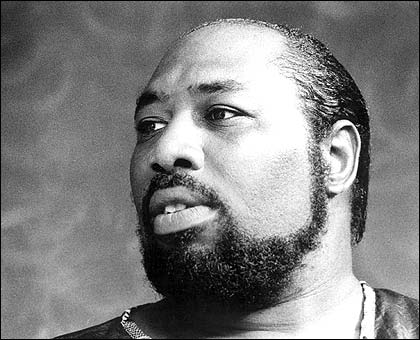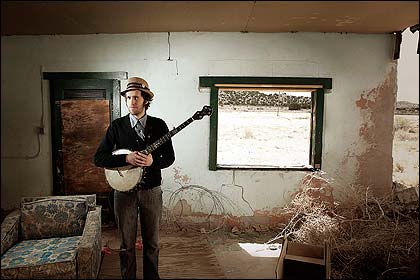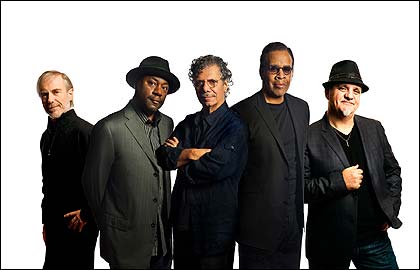
Seattle’s Scholars
Underground hip hop has always been a socially diverse medium. Everybody got in on the action and the multicultural landscape of the scene became a rainbow coalition of sorts — Blue Scholars are the embodiment of this, and more.
 |
| Blue Scholars sold out their last show at WOW Hall. Photo by Todd Cooper. |
Hailing from the rainy streets of Seattle, the Iranian DJ Sabzi and Filipino MC Geologic came together to create the most prominent hip hop group to emerge from their hometown. The name, Blue Scholars, has been synonymous with Seattle hip hop for the last decade. It’s no real wonder why. They are the best sounding hip hop group to ever come out of the Pacific Northwest.
The Blue Scholars make introspective, funky and racially conscious hip hop with a laid-back style. They are more likely to rap about couch crashing, backpacking, single parenting or how important a morning cup of coffee is than anything extravagant or disingenuous. Straddling the line between raw no-chorus style hip hop, like Phoenix Orion or Kool Keith, and more traditional chorus-verse-chorus style groups, like Jurassic 5, the Blue Scholars sound like A Tribe Called Quest crossbred with Dilated Peoples.
Musically, Blue Scholars sample from an eclectic pool that ranges from Spanish guitar to funk music to classical — you won’t find any synthesizer licks or modified vocal effects in their sound. They don’t have any pretensions, they don’t have tough guy complexes, they don’t battle-rap or glorify misogyny — and really, for the most part, no underground hip hop does — that’s why they call it “conscious” hip hop. But the Blue Scholars have a style about them that is unique to Seattle. It sounds like what you’d listen to on rainy days, sitting on your stoop. Blue Scholars create music for the moments that aren’t necessarily spectacular; their lyrics and style affirm everyday life while at the same time rejecting drudgery.
Still going, with years and years of experience under their belt, having gigged with every notable hip hop group to come through Seattle over the last ten years (and that’s a lot), the Blue Scholars continue their beats, rhymes and life. While they give shout outs to older influences such as the Dead Prez Lets Get Free album, and pave way for other Seattle hip hop artists like Macklemore, Blue Scholars always rock the mic and kick realness through the speakers.
Blue Scholars play 9 pm Tuesday, Sept. 20, at WOW Hall; $15 — Dante Zuñiga-West
One of a Kind
 |
Invariably, when friends and fans talk about Eugene musician JC Rico, the first thing they mention is “that voice” — by turns deep and raspy or pure and smooth as single malt Scotch. Rico was a gifted vocalist whose range and delivery were unrivaled in the local blues and jazz scene. As fellow musician Brian Chevalier told KLCC radio’s Jonathan Siegle, “He was an institution,” adding that Rico’s was always the first name to pop up when folks spoke of great singers in Eugene.
Born Joseph Charles Moore in Hollandale, Miss., in 1947, JC Rico passed away Sept. 4 at his home in Junction City. He was 64.
From the beginning of his life, Rico appeared destined to sing the blues. As a child, his family moved from the Deep South to the urban environs of Chicago; Rico played his first paying gig when he was only 6 years old. He eventually moved to Portland, where he played in a band with Lloyd Jones, before settling in Eugene.
Guitarist Steve Ibach, who played with Rico in various bands over the past seven years, says he first met the vocalist sometime in 2002 at a Wednesday night blues jam at the old Vet’s Club. “His singing just blew me away,” Ibach recalls. “He had an incredible range and a lot of power in his voice. I’ve seen people well up in tears in front of the stage at some of our shows, just from being so moved by the feeling in his singing.”
Longtime Eugene musician (and EW director of sales and marketing) Bill Shreve calls Rico “a singer’s singer,” an honorific of the highest order for those in the know. “He had a power and beauty in his voice,” Shreve says. “His falsetto would bring you to tears,” which was certainly the case when Rico sang a rendition of “Amazing Grace” at the Nov. 29, 2009, memorial for Ted “Papa Soul” Lee at McDonald Theatre.
“There was nobody else around here who could sing like that,” Ibach says. “There’s a big hole in the Oregon blues scene at the moment. His shoes will be hard to fill.”
A celebration of the life of JC Rico through music will take place 4 to 7 pm Sunday, Sept. 18, at Mac’s at the Vet’s Club, 1626 Willamette St.; memorial contributions can be made to “JC Rico Memorial Account” at any Pacific Continental Bank. — Rick Levin
That’s Just How They Roll
 |
Ever know one of those dudes who can play just about any instrument you throw at him? Meet Aaron Keim: multi-instrumentalist, scholar, teacher, craftsman and talented everything-man. He’s been playing with the indie-Americana group Boulder Acoustic Society for some time now, but that doesn’t mean he can’t find time to play solo on the side — be it ukelele, French horn or otherwise — and that’s all just part of doing what he loves. His style faces backward to traditions of old — dating back to the Great Depression and beyond — but he still pioneers new ways of playing, thinking and adoring old-time music: Clawhammer-style ukelele, for example, is not a common occurrence (Clawhammer is generally reserved as a banjo technique), but Keim said fuck it and did it anyway, because that’s just how he rolls.
James Hill, who’s been known to join Keim and the Boulder Acoustic Society, is of the same breed. His focus is hard bent away from ukelele, though, and he’s worked tirelessly to cultivate a following for the instrument that doesn’t see it typecast as a Hawaiian traditional. The versatility of Hill’s playing is fairly remarkable considering he’s pushed through since the early 2000s — a time when ukelele held next to no weight in popular or indie music culture. Hill is well respected in Hawaii, too, despite attempting to drag the uke away ever so slightly from its roots, and he’s been praised for his ability to blend in with ukelele culture even though he’s really just a talented-as-hell kid from Canada — not unlike Keim, that’s just how he rolls.
Aaron Keim & James Hill play 7:30 pm, Thursday, Sept. 15, at Agate Alley’s Laboratory; $13.50 adv., $15 door. — Andy Valentine
Fusion Pioneers
Carmen Souza brings her Cape Verdean jazz fusion to The Shedd Sept. 22. The young Portuguese-born (from a Cape Verdean family) songwriter has absorbed influences from one of her elders, the great singer Cesaria Evora, but adds a jazzier, funkier beat that stretches back to another great musician of Cape Verdean descent, the marvelous post-bop pianist and composer Horace Silver (whose famous “Song for my Father” she sometimes covers). Souza’s voice is lighter and nimbler than other jazz divas, but it bubbles brightly in the context of both her danceable pieces and the more melancholy ballads. Both jazz and world music fans should check this one out.
 |
The next night, Sept. 23, The Shedd hosts the biggest jazz show of the season: the return of Return to Forever (pictured). This lineup differs slightly from the one that lit up The Shedd two years ago, but it still features legendary founder/keyboardist Chick Corea, bassist extraordinaire Stanley Clarke and drum legend Lenny White — all some of the first stars of the fusion movement that stirred together jazz and rock in the 1970s. Corea, Clarke and White will be joined by one of the second generation fusion phenoms, electric violinist Jean-Luc Ponty, and guitarist Frank Gambale, who excelled in Corea’s later Elektric Band. They’ll be playing some of the band’s familiar hits of early fusion and solo career showcases along with originals, some composed for their newly released album Forever. Dweezil Zappa opens with music by his famous dad, Frank Zappa, one of the most innovative and idiosyncratic rock stars ever.
Corea became famous for his pioneering electric piano and synth sounds. You can hear the music of what some call the original synthesizer, the organ, in a couple of afternoon concerts this month by two of the city’s most accomplished exponents of the instrument. On Sept. 18, Barbara Baird will celebrate the newly refurbished (by famed organ builder Lanny Hochhalter) 1957 Moeller pipe organ at First Congregational Church with music by J.S. Bach, Maurice Duruflé, Samuel Barber and more. And on Sept. 25, Julia Brown will play 19th century French organ music by César Franck, Louis Vierne and Charles-Marie Widor on the Hochhalter organ at First United Methodist Church.
— Brett Campbell